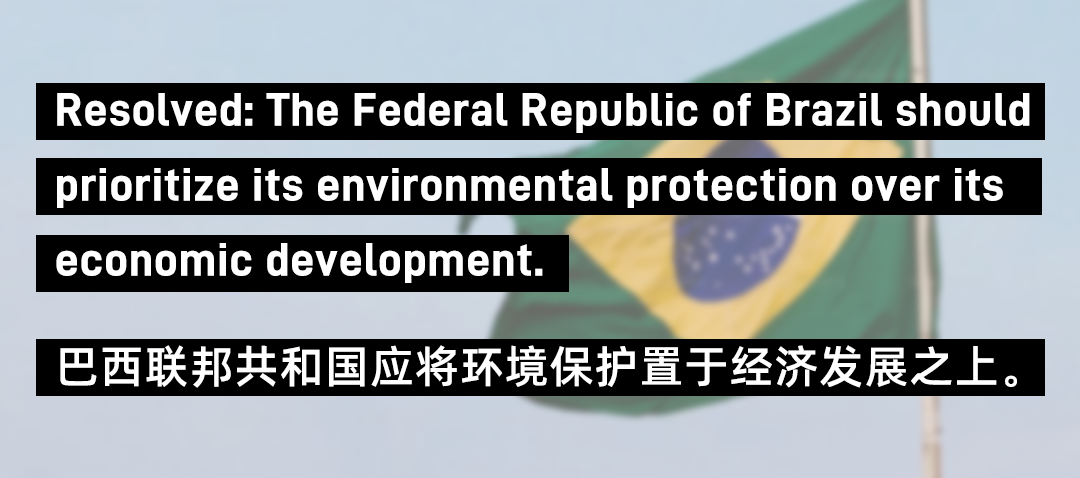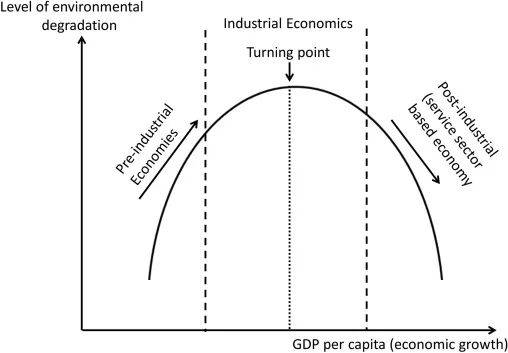转眼春季赛已经结束
这也意味着每年暑期的迪贝“高端局”
就要到来了
相信准备参赛的同学们
已经对今年的辩题有了大致的了解
进入了紧张的备赛阶段
然而,想要在比赛中占得先机
备赛阶段就要求我们
更加细致全面地审题、拆题
找出其中的“key words”
那么就让我们先来回顾一下辩题吧!

为了帮助大家更加精准快速地
找到辩题切入点
今天就由Coach Jackson为大家带来
NHSDLC暑期赛辩题解析


During the DLC national competition, debaters will address the following resolution: “TheFederative Republic of Brazil should prioritize its environmental protection over its economicdevelopment.” This topic analysis begins with a brief overview of the recent events that likelyinfluenced the selection of this resolution.
Following that, we will define the key terms within theresolution, examine the burdens that affirmative and negative teams must meet to win theirrounds and provide essential background information on Brazil’s economy and environment.
Finally, we will discuss affirmative and negative arguments that participants will likely encounterduring their national debates.

When preparing for a debate, contemplating the reasoning behind the topic selection committee's choice of resolution can help to understand what arguments your judges may be aware of and inclined to agree with. In the case of the national topic, two events brought Brazil's economic and environmental issues to the forefront of international news outlets. During the month of August in 2022, the number of forest fires in the Brazilian Amazon hit a 15-year high, providing the latest warning on the advancing destruction of the world's largest rainforest. As newsreels of the forest’s destruction spread across social media and mainstream news stations, Brazil’s substandard nvironmental policy quickly captured global attention.
Just a year before this incident, In January of 2021, tens of thousands of demonstrators took to the streets of Brazil’s biggest cities Saturday, calling for the country’s then-president, Jair Bolsonaro, to be impeached. In Rio de Janeiro, the country’s second-largest city, huge crowds paraded through the downtown area in a sign of growing discontent with the president — whom critics accused of destroying Brazil’s economy and neglecting the millions of Brazilians suffering from extreme poverty.
These events help to highlight the significance of the environmental and economic hardships plaguing Brazil and set the stage for the DLC national topic.

Although the resolution may seem straightforward, delving into what it means to "prioritize" one thing over another is essential to understand what affirmative and negative teams have to defend during debates. Notably, there are multiple ways to define the word "prioritize." Cambridge Dictionary defines prioritization as the process of “deciding which of a group of things are the most important so that you can deal with them first.” For example, if a student chooses to prioritize their homework over video games, they'd abstain from playing video games until they’ve first dealt with, or completed, their assigned homework. Simple enough, right? However, while the scope of most homework assignments is clearly defined (i.e.“complete problems 3-27 on page 335”), the actions necessary to protect Brazil’s environment are less straightforward, so teams using this definition will have to determine what must be done to help the environment before the Brazilian government can start to focus on promoting economic development.
Another definition of prioritization can be found in Collins Dictionary, which states, "If you prioritize something, you treat it as more important than other things."Applying this definition, in a scenario where Brazil faces two choices – one harming the economy but benefiting the environment, and the other benefiting the economy but harming the environment – Brazil would opt for the choice that most effectively safeguards its environment in an affirmative world. However, unlike Cambridge’s definition, this conception of prioritization seemingly allows Brazil to pursue environmental and economic objectives at the same, provided that their economic development doesnt hurt the environment. Although both definitions overlap in some respects, the course of action taken by Brazil, which affirmative teams have the burden to defend, largely depends on which definition teams prefer to use in the round.
Much like the word "prioritize, " the world of the negation can be thought of in two different ways. For context, the formal negation of a proposition can usually be expressed by adding the phrase "It is not the case that" to the beginning of the proposition. So, teams on the negation will have to argue the following: "It is not the case that The Federative Republic of Brazil should prioritize its environmental protection over its economic development." This reformulation of the resolution allows for debaters to justify the negation one of two ways. One interpretation of the resolution's formal negation would suggest that Brazil should prioritize it's economic development over environmental protection.
Alternatively, teams can choose to argue that Brazil should view economic development and environmental protection as being equally important priorities. Regardless of which option you choose, it's important to note that the precise meaning of these interpretations is also influenced by the way debaters choose to define the word "prioritize."

Brazil's environment, often referred to as “the lungs of the earth,” is characterized by its immense biodiversity and a variety of ecosystems, each with unique challenges and opportunities for conservation. For starters, Brazil holds about one-third of the world's remaining tropical rainforests, including about 60% of the Amazon rainforest. The Amazon, one of the most biodiverse regions on the planet, contains approximately three million species (Wilson), over a million indigenous people (Frost), and more than 20% of the world's fresh river water (Salati). Moreover, the rainforest is a carbon sink, meaning it stores more carbon than it produces; in fact, the soil and trees of the Amazon store more than 150 billion metric tons of carbon (Bryce). The Cerrado is another major biome in Brazil, covering nearly 22% of the country’s landmass. It plays a critical role in Brazil’s agricultural production and creates more than 50% of the world's soybean supply (Valdes). As you’ll discover through debating this topic, Brazil’s environment is threatened by a wide range of issues, including climate change, deforestation, invasive species, wildfires, and rapid urbanization.
Brazil, the largest country in South America, has a diverse and complex economy. Agriculture and livestock production have istorically been cornerstones of Brazil's economy, contributing approximately 25% of their GDP (Barrons). Beyond soybean exports, the country is also one of the world's largest producers of coffee, sugarcane, beef, and poultry (Almeida).
While Brazil's agricultural sector has the potential to gain a larger share of the global market in the coming years, agricultural expansion may come at the cost of the environment, as finding new land often requires clearing forests in the Amazon and Cerrado. The mining sector also plays a major role in the Brazilian economy and its international trade. The three primary mineral commodities in Brazil in terms of economic value are iron ore, copper, and gold (Raportit). While most of Brazil’s energy consumption is supplied by renewable energy, such as hydropower, solar, and wind, the country owns the largest ultra-deep oil reserves in the world and is gearing up to become the fourth largest oil producer globally (Čavčić).
Finally, the services sector is the largest contributor to Brazil's GDP (Sadler), encompassing finance, retail, telecommunications, and tourism. Despite its size and diversity, Brazil's economy faces several challenges. Income inequality is high, with a significant portion of the population living in poverty. The country also grapples with high levels of public debt and inflation, which can impact its future economic stability.

Given the topic’s wording, almost all affirmative arguments will present reasons for why protecting Brazil’s environment is crucial. To provide a preliminary overview of what affirmative arguments may address, we’ll cover some of the international and domestic implications of Brazil’s environmental degradation.
Teams are likely to argue that the destruction of Brazil’s rainforests would be disastrous for the global community. A recent study published in the scientific journal Nature found that 10% to 47% of the Brazilian Amazon could be dismantled by 2050 if warming and rates of deforestation aren’t dramatically curbed (Bush). This is because wildfires and deforestation can permanently destroy the water cycle that sustains parts of the Amazon rainforest, causing it to transition into a savannah.Preventing the Amazon’s savannization has a wide range of impacts affirmative teams can choose from.
For starters, losing the Amazon would greatly accelerate global climate change: scholars have long argued that the sudden loss of the Amazon and its stored carbon would prevent the international community from keeping global warming below a 1.5-degree C increase from preindustrial levels (Bryce). Problematically, failing to limit global temperature increases to 1.5°C will cause an additional 3 million heat-related deaths annually by the end of the century (CVF).
Moreover, the destruction of the Amazon and subsequent loss of biodiversity would be disastrous for global access to medication. Currently, 25% of all medications are derived from plants in the Amazon Rainforest, with 75% of these plants being unique to the region and found nowhere else on the planet (House). Apart from losing the Amazon, teams may argue for the importance of preventing land-clearing in the Cerrado, which will soon destabilize the ecosystems that Brazil’s soy, cattle, sugarcane, and corn trades rely on, potentially causing worldwide food shortages if current trends continue (WEF).
Debaters should also be prepared to engage with arguments centering on the domestic implications of Brazil’s environmental deterioration. For example, the Amazon’s savannization would greatly destabilize Brazilian weather patterns by decreasing local rainfall by 30% (Bryce). Already, droughts in the Amazon basin have restricted the movement of people and goods by boat, making it even more difficult for remote communities to access health and education facilities, and left thousands of people facing water and food shortages (SchröDer).
For teams preferring to use Cambridge Dictionarie’s definition of prioritization, these arguments offer a reason for why the environment needs to be addressed before other less time-sensitive problems facing the economy; If no further action is taken to save the Amazon, climate shocks could push between 800,000 and 3,000,000 Brazilians into extreme poverty as soon as 2030 (World Bank). Teams may also highlight the impact environmental damage and resource extraction has on the millions of Indigenous people living in the Amazon that have lost their homes and culture to colonization (Frost).
Teams on the negation are likely to run a contention predicated on the idea that greater economic development will lead to more environmental protection in Brazil.
This perspective underlies what economists refer to as 'The Environmental Kuznets Curve' , which shows that as an economy grows, environmental degradation initially increases but eventually decreases after reaching a certain level of income per capita. One explanation provided by scholars for this trend is a shift in public priorities; as more individuals move out of poverty and become less concerned about affording basic necessities, there comes a point where income is high enough for people to prioritize a clean environment and become willing to pay for it (Geloso).

▲ 图源Science Direct
Another key mechanism through which economic growth can benefit the environment is by promoting efficiency in the use of resources; when countries become wealthier, they are able to invest in technologies and practices that allow them to produce more output with fewer resources (Ekins). This can lead to a reduction in waste and pollution, as well as a lower overall environmental impact. Notably, the positive effects of economic growth were empirically verified in Brazil, where an 80% decline in deforestation coincided with 3.5% average annual economic growth from 2005 to 2014 (Unterstell). In addition to arguments claiming economic growth helps the environment, teams can argue that economic hardship hurts the environment. For instance, many experts have suggested that the best way to protect the Amazon is to create moreopportunities for Brazilians to earn a living that dont require damaging the rainforest (Larson).
The negation may also try to argue that economic development is necessary for climate adaptation in Brazil. For context, climate mitigation involves preventing or reducing the emission of greenhouse gasses into the atmosphere (e.g., stopping deforestation and increasing the use of renewable energy), whereas climate adaptation involves adjusting to the current and future effects of climate change. Teams advocating for the importance of climate adaptation will likely argue that Brazil has little to no control over the largest threats to the Amazon. For example, scientists from the World Weather Attribution group stressed that the fate of the rainforest—and the implications of forest loss—is a global concern: "Even if Amazonian countries commit to net-zero deforestation and reach this goal in the next decades, this huge effort may be useless if the whole world does not commit to sharply reducing greenhouse gas emissions" (Bernardo).
Given that global greenhouse gas emissions are projected to rise by 10.6% by 2030 (Grainger), teams can argue that Brazil must focus equally, if not more, on preparing its people for climate change as it does on protecting its environment. To better adapt to the effects of climate change, Brazil will need to pursue further economic development. This includes upgrading its infrastructure to withstand extreme weather events and rising sea levels, as well as making its agriculture less reliant on rain. The impacts of greater climate adaption in Brazil would be significant; for instance, while studies have predicted heat waves will kill over 50,000 Brazilians in the coming two decades (Esquer), it is estimated that more proactive health adaptations in
cities, such as enhanced tree canopies and more reflective, less heat-absorbing surfaces, could reduce heat-related mortality by 40% to 99% (Patz).
参考文献: Almeida, Jorge. Brazil in Focus: Economic, political and social issues. Nova Publishers, 2008.
Barron, Michael. “ Brazil’s Agricultural Industry.” globalEDGE Blog: Brazil’s Agricultural Industry >> globalEDGE: Your Source for Global Business Knowledge, globalEDGE, 14 Nov. 2023, globaledge.msu.edu/blog/post/57338/brazil’s-agricultural-industry.
Bernardo Flores, Critical transitions in the Amazon forest system, Nature (2024). DOI: 10.1038/s41586-023-06970-0. www.nature.com/articles/s41586-023-06970-0 Bryce, Emma. “Why Is the Amazon so Important for Climate Change?” Scientific American, Scientific American, 20 Feb. 2023, www.scientificamerican.com/article/why-is-the-amazon-so-important-for-climate-change1/.
Ekins, Paul. "The Kuznets curve for the environment and economic growth: examining the evidence." Environment and planning a 29, no. 5 (1997): 805-830.
Esquer, Michael. “Study on Brazilian heat wave deaths shows gender, racial disparities.” Mongabay, 28 Mar. 2024, news.mongabay.com/2024/03/study-on-brazilian-heat-wave-deaths-shows-gender-racial -disparities/.
Frost , Rosie. “The Power of the Amazon Rainforest’s Thousands of Unique Plants.” Euronews, 2 July 2020, www.euronews.com/green/2020/07/02/harnessing-the-power-of-thousands-of-unique-pla nts-in-the-amazon-rainforest.
Geloso, Vincent. “Why Economic Growth Is Good for the Environment: Montreal Economic Institute.” – IEDM/MEI, 13 July 2023, www.iedm.org/why-economic-growth-is-good-for-the-environment/.
Grainger, Matt . "G20 Countries Failing by Big Margins to Cut Greenhouse Gas Emissions Below Catastrophic." Oxfam International, 7 September 2023 www.oxfam.org/en/press-releases/g20-countries-failing-big-margins-cut-greenhouse-gas -emissions-below-catastrophic.
House, William. “The Amazon Rainforest Pharmacy.” Home -, 18 May 2020, archeanweb.com/2020/04/20/the-amazon-rainforest-pharmacy/.
Larson, Christina. “ Poverty is killing the Amazon rainforest. Treating soil and farmers better can help save what's left ” The Indep https://www.independent.co.uk/news/amazon-ap-brazil-rainforest-editors-b2448551.html
Patz, Jonathan A. “Climate Change Challenges and Opportunities for GlobalHealth.” Clinical Review & Education September 22, 2014. https://www.landscapepartnership.org/maps-data/climate-context/cc-resources/ClimateSciPDFs/JAMA%20climate.pdf/app-download-file/file/JAMA%20climate.pdf
Raportit, Edustustojen. “ Business Opportunities in the Mining Sector in Brazil.” Ulkoministeriö , 4 Mar. 2024, um.fi/edustustojen-raportit/-/asset_publisher/W41AhLdTjdag/content/business-opportunit ies-in-the-mining-sector-in-brazil/384951.
Sadler, Mary. “Why the Service Sector’s Contribution to Brazil Is Important.” Market Realist, Market Realist, 20 Nov. 2020, marketrealist.com/2017/02/service-sector-contribution-brazil-important-growth/.














